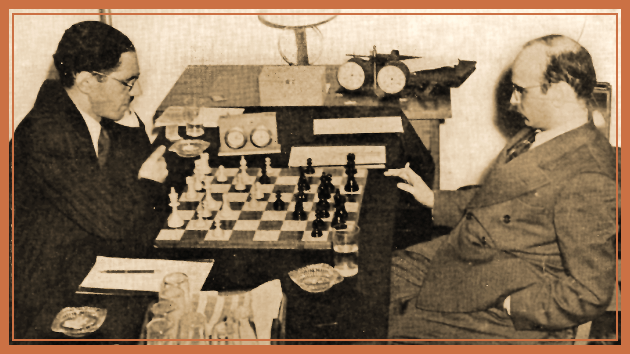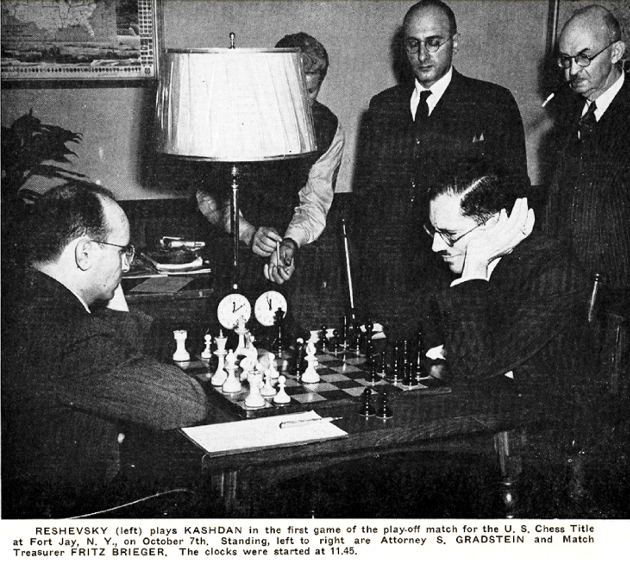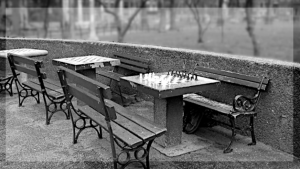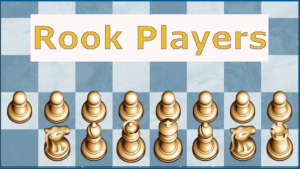
War Games: Reshevsky-Kashdan
In the latter part of 1941 the USCF, only three years old, started finalizing its plans for the 1942 performance of its crown jewel, the U.S. Championship. But in December the unthinkable happened and the United States was pulled into a war on multiple fronts.
Reacting with a patriotic knee-jerk, George Sturgis, USCF president announced the cancellation of that prestigious event.
 "Chess Review" Jan. 1942
"Chess Review" Jan. 1942
In spite of their apparent good intentions, the officials should have followed the well-worn chess adage of sitting on their hands before making this move. The announcement was met with immediate, forceful and almost universal criticism from all sectors.
Even in the issue where the announcement first appeared, Horowitz and Harkness published an appeal to reconsider:
The officials were quick to reverse their stance:

"Chess Review" Feb. 1942
The U.S. Championship took place from April 10th to April 30th. Due to the absence of many of the strongest players such as Fred Reinfeld, Sidney Bernstein, Reuben Fine, Abraham Kupchic, Albert Simonson and Arthur Dake, the championship has been considered one of the weaker ones.
The tournament ended in a tie between Samuel Reshevsky and Isaac Kashdan. Two particular events put them into that position. The first was an incident involving the referee/TD/tournament committee chairman, Llewellyn Walter Stephens:

"Chess Review" April 1942, by Kenneth Harkness

"Chess Review" May 1942, by Isaac Kashdan
Arnold Denker gave his version, now the commonly accepted version, of this event in "The Bobby Fischer I Knew" In Denker's narrative, the Reshevsky's flag fell first, perhaps figuratively, because as shown above, the clocks weren't so equipped. 
At any event, this put Denker out of the running while giving Reshevsky the save he needed.
The second incident again showed there is indeed luck in chess. In the final game, Reshevsky vs Horowitz, Horowitz missed what's been termed an obvious-once-you-see-it winning line and the game ended in a draw (see: Game of the Month). Reshevsky had won the U.S. Championship through tournaments in 1936, 1938 and 1940. In 1941 he had played Horowitz a lopsided 16 game match for the title in which Reshevsky won 3 and drew 13.
While the 1942 tournament ended in a tie for first, a play-off would determine who would get the title of United States Champion.
The war raged on and during its course American chess players would do their part supporting and entertaining those involved in that struggle. Even before the U.S. entered the fray, players were raising funds for such war-related organizations as the Russian War Relief.
The play-off itself was used to send a message from the USCF that American Chess was patriotic and the first 4 games were scheduled to be played at military camps:
These were scheduled and announced even before the subsequent venues were arranged. However, due to some conflict, the Pine Camp venue was cancelled. As it turned out, of the 11 games played, the first 3 games were played in military camps, while the rest: one at the Marshall C.C., one at the Queen's C.C., one at the the Manhattan C.C. and five at the Henry Hudson Hotel.

The first three games, sponsored by the U.S.O., were an all-out war in which Reshevsky won the 1st and 3rd while Kashdan won the 2nd. The time control had been set as 2 hours and 15 minutes for the first 45 moves.
Game 1

This game was played in the Reading Room of the Y.M.C.A. as Fort Jay. Play began at 8:00 p.m. Reshevsky, winning the coin toss, played White while a large crowd of soldiers watched.
Game 2
Starting in 1936, Reshevsky had played 75 U.S. Championship games without a single loss. If nothing else, this game won by Kashdan is noteworthy as having ended that winning streak.
The game, played at the Service Club at Camp Upton was conducted under particularly trying conditions. Next door to the Service Club there was a dance with live band music that made it hard to concentrate.
A noteworthy observation is that Reshevsky had 30 seconds left on his clock on move 34. He made the 11 remaining moves with 3 seconds to spare.
Game 3
In contrast to the previous game, this one at Plattsburg Barracks on the shores of Lake Champlain, was played in the Post Library under quiet, dignified conditions. Due to recent troop transfers, the audience as extremely small.
With 15 minutes to go in this game, both sides were in danger of time forfeiture and the final moves were made in lightning fashion with Reshevsky missing a quicker win.
.
.
Game 4

The Bridge Room of the Marshall Cub where game 4 took place was filled to capacity with 50 privileged people, but upstairs in the main club room 150 more fans followed the game live with Horowitz commentating at the demonstration board. This was the largest event ever held at the Marshall Club to date. On move 17, Reshevsky went into a half hour study during which Irving Chernev entertained the audience with his anecdotes. After an adjournment for dinner, 50 members selected by chance were divided into two teams who played a team match of 25 games, all starting with the position being that after the first four moves played in the actual game. The Black team won 131⁄2-111⁄2 (White, on the other hand, won the actual game). Edward Lasker and A. Englemann were presented autographed copies of Marshall's "My Fifty Years of Chess" (ghost-written by Reinfeld) for the best played game from each team.
Horowitz commentating
Once again, Reshevsky was in time trouble and had to make 15 moves in 2 minutes to keep from timing out.
.
.
..
.
.
.
Game 5
The fifth game was played at the Queens Chess Club. It was sponsored by Fritz Brieger, president of the club and treasurer of the Match Committee. Kashdan, in time trouble, couldn't find an adequate defense.
.
.
.m
Game 6
Game six was sponsored by the Manhattan Chess Club held in its club rooms at 100 Central Park South. The attendance was limited to members only. This was the first drawn game of the match.
.
.
.
At this point the tightly contested match was only slightly in Reshevsky's favor at +3-2=1 but out of the remaining 5 games, Reshevsky would win 3 (7th, 10th and 11th), draw 2 (8th and 9th).
The final five games were held at the Henry Hudson Hotel under the auspices of "Chess Review" magazine. The contestants played in the Modern Room while the "Chess Review" editor-in-chief, Al Horowitz set up an Open Forum in the African Room. To offer some respite from the game itself, showman Horowitz staged a guessing game, giving prizes to those who best guessed the actual moves. He also bought in other "Chess Review" editors such as Phillip L. Rothenberg, the Problem Editor who discussed unusual chess problems, the "Oddities" Editor, Irving Chernev who showed some surprising endgame compositions and the Games Editor, Fred Reinfeld who demonstrated variations in the opening phase.
 A December 1942 ad for the last 5 games, sponsored by "Chess Review"
A December 1942 ad for the last 5 games, sponsored by "Chess Review"
Game 7
.
.
..
.
.
Game 8
.
Game 9
.
.
.
Game 10
.
.
.
Game 11





